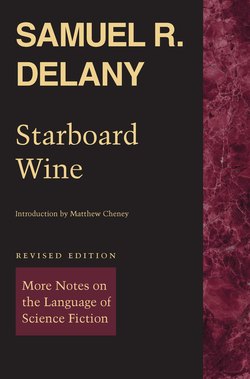Читать книгу Starboard Wine - Samuel R. Delany - Страница 8
На сайте Литреса книга снята с продажи.
ОглавлениеAcknowledgments
The essays that make up this book were all written after a 1977 term as a fellow at the Center for 20th Century Studies at the University of Wisconsin at Milwaukee, where I had a chance to try out a dense and difficult book as a study text on a class of alert, adventurous students as well as on a number of faculty members who were interested in the teaching and criticism of science fiction. That book was The American Shore: Meditations on a Tale of Science Fiction by Thomas M. Disch—“Angouleme” (Dragon Press; Elizabethtown, 1978). Somewhat to my surprise, it was those most receptive to and appreciative of the theoretical complexity of the Shore who were most persuasive in their arguments that I must take on the job of becoming my own popularizer. I must say here that in no way do these essays present a systematic popularization of the thinking in The American Shore. Still, a number of the ideas to be found here can be found in kernel in that more difficult book. A number of others, new here, have been presented—here—in such a way as not to contradict any of the ideas put forth in the previous work. Although these essays are not a systematic introduction to The American Shore, needless to say, reading them will certainly leave one better prepared to grapple with it. My thanks go, then, particularly to Teresa de Lauretis for articulating the necessity of popularization most clearly. Thanks as well go to Catherine McClennahan, Tom Moylan, and Mary Kenny Badami for their questions, attentions, and insights. My gratitude also goes to Ralph Cohen, of New Literary History, who argued me out of the use of the term genre from a theoretical standpoint, and to Brian Aldiss, who slew any further possibility of its use by some hard-headed and intelligent observations.* My thanks go to David Jackson, formerly of the Studio Museum in Harlem, who invited me to deliver there “The Necessity of Tomorrow(s)” in winter 1978. Victoria Schochet, formerly of Analog Magazine, submitted “Science Fiction and ‘Literature’” to an astute editorial going-over, when that magazine first published the piece in spring 1978; this resulted in major clarifications as well as my first and rather humbling realization that professional science fiction editors might be honestly interested in what an SF writer had to say about a real and pressing situation; I am grateful for her time, effort, and insight. My thanks go to Robert A. Collins for inviting me to deliver “Dichtung und Science Fiction” at the Conference on the Fantastic at Florida Atlantic University in 1982. My thanks go also to Darko Suvin, who first suggested I write the essay “Russ,” and to Jane Weedman, who gave me an opportunity to deliver it at the Comparative Literature Symposium at Texas Tech University in January 1983. Equal thanks also go to the organization committees of Anonycon, Minicon, Norwescon, Balticon, and Torque for having me as guest of honor, where versions or sections of pieces here were tried out as guest-of-honor speeches. To all the editors of Science Fiction Studies, Robert Philmus, Charles Elkins, and Darko Suvin, I am inexpressibly grateful. My thanks go also to David Hartwell, who, besides acting as editor and publisher of this entire collection, first requested the pieces “Heinlein” and “Sturgeon” as introductions to volumes in his library reprint series for Gregg Press in, respectively, 1979 and 1977. Michael Skloff submitted the entire manuscript to an astute and conscientious editorial mediation for which it would be impossible to thank him enough. Patrick Nielsen Hayden was helpful with points of fact, for which I am grateful. With all the aid I have received, doubtless there still remain lapses, if not in fact, then in focus and style. But these are my own.
Samuel R. Delany July 2011
*A conviction that lasted just long enough to write the essays in this book, whereupon, fortunately, it reversed.
